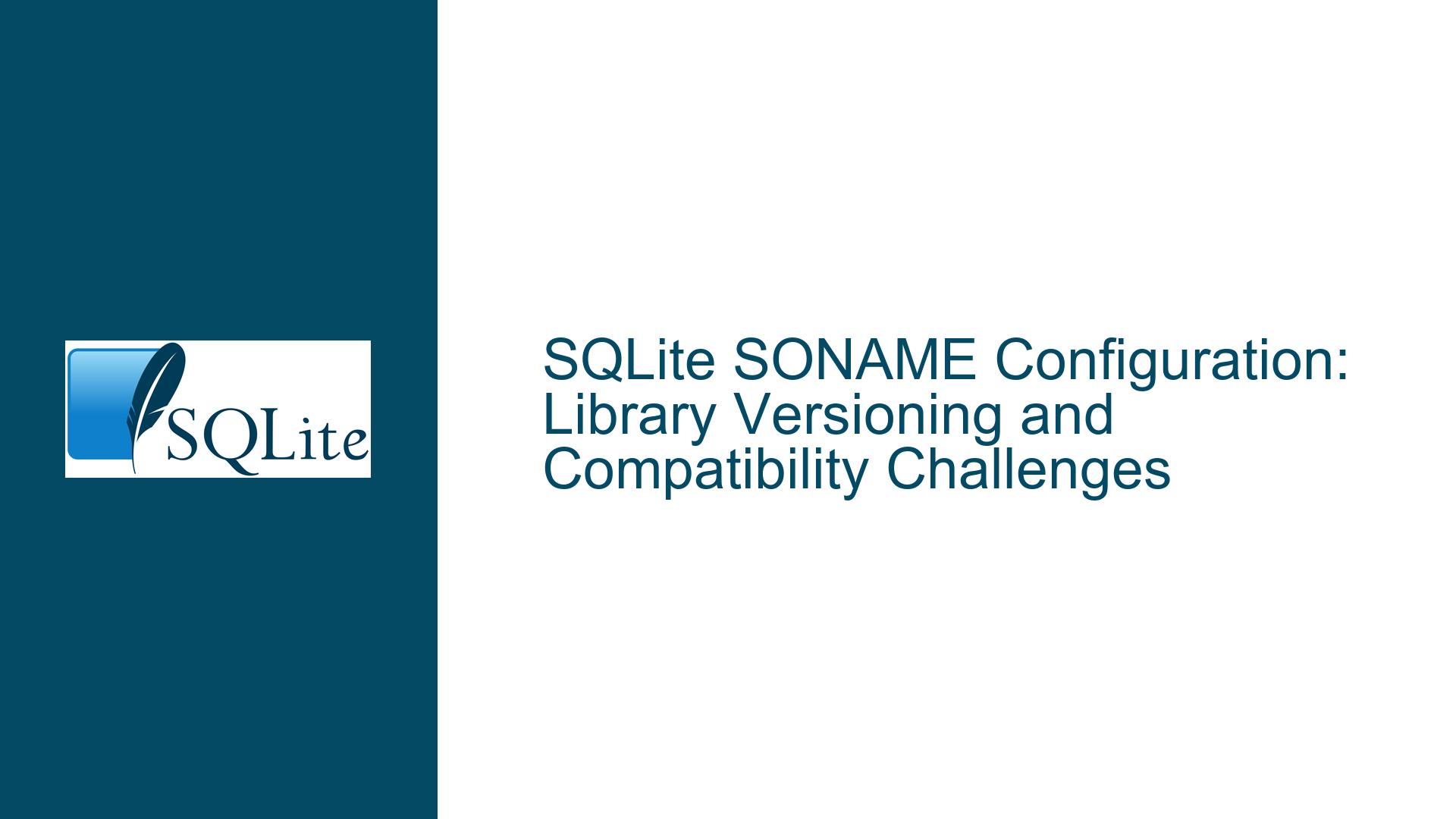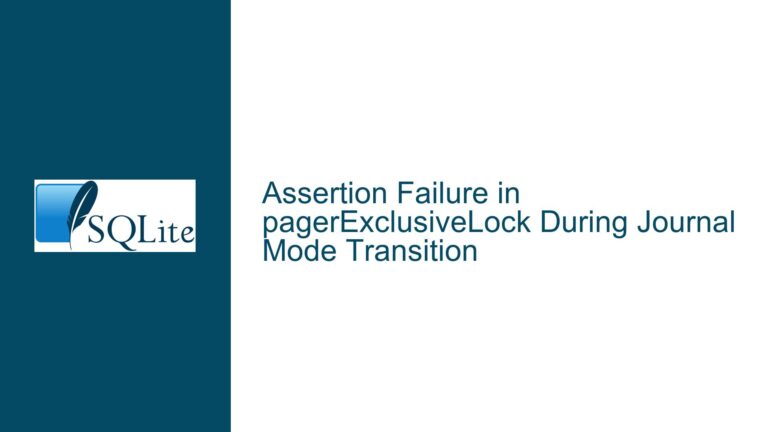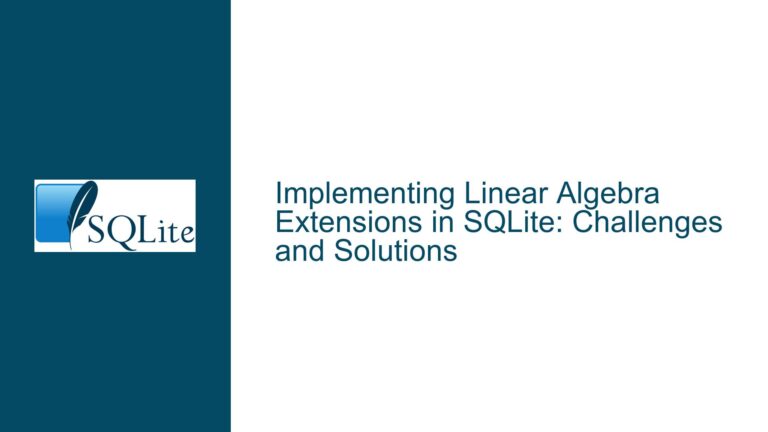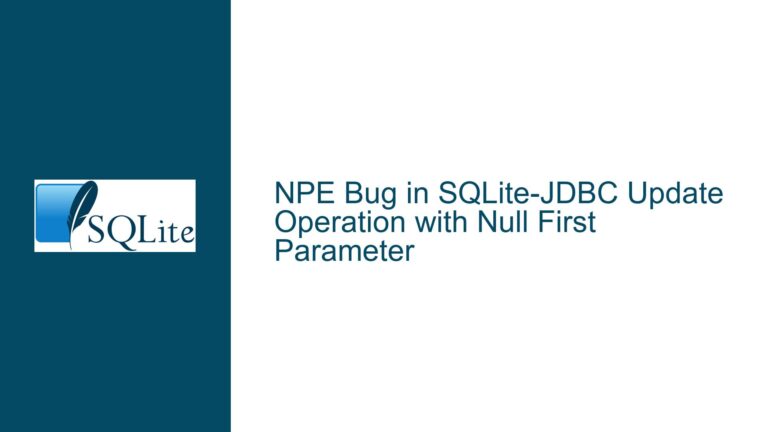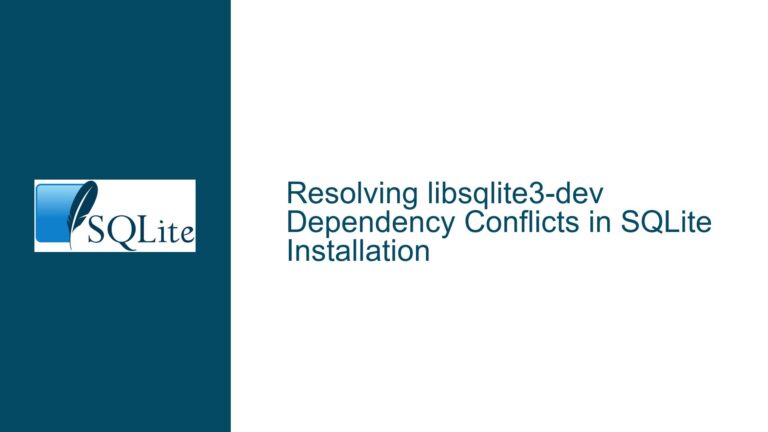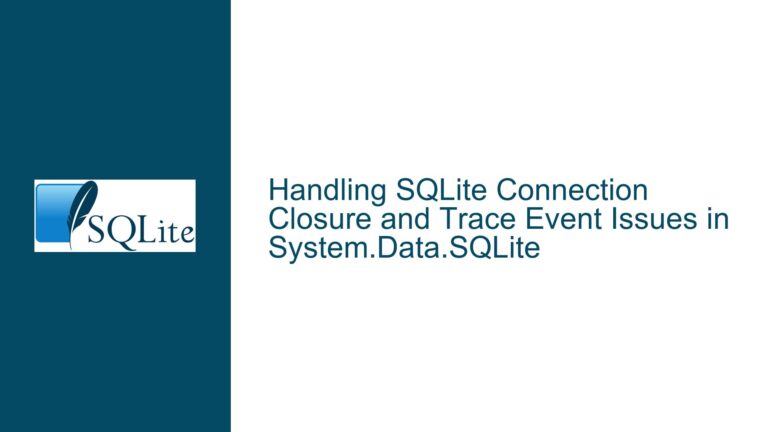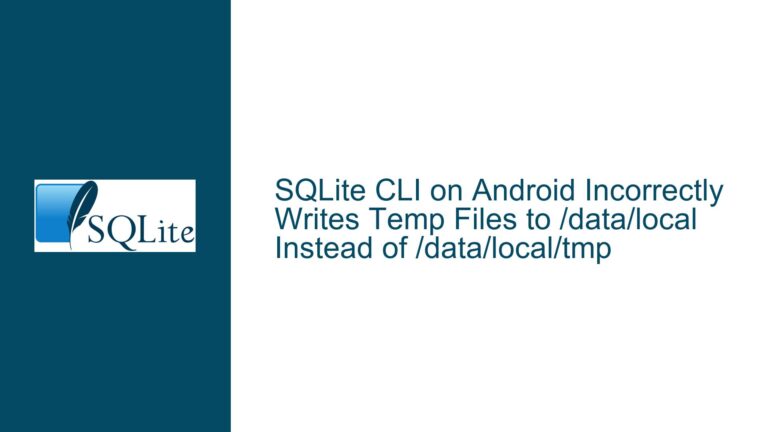SQLite SONAME Configuration: Library Versioning and Compatibility Challenges
Analyzing SQLite’s Dynamic Library Versioning Transition
The SQLite project is undergoing a significant transition in how dynamic library versioning is handled, particularly concerning the SONAME (Shared Object Name) configuration in version 3.48.0. The core issue revolves around maintaining compatibility with existing applications while modernizing the build system to accommodate diverse platform requirements.
The historical context shows SQLite previously used a fixed SONAME of ‘libsqlite3.so.0’, which originated from libtool conventions. This versioning scheme has become deeply embedded in many downstream applications and distribution packaging systems. The transition away from this convention in the new autosetup build system has raised concerns about backward compatibility and system integration.
Package maintainers have highlighted several critical aspects of this transition. First, the removal of explicit SONAME handling affects how dynamic library dependencies are resolved on various platforms. On Linux systems, the traditional approach involves separating development files (including the unversioned .so symlink) from runtime files, with the SONAME playing a crucial role in this separation.
The technical implications are substantial. Without a specified SONAME, applications linked against SQLite will look for ‘libsqlite3.so’ instead of ‘libsqlite3.so.0’, which can cause runtime issues on systems where only the versioned library is available in the runtime path. This behavior differs from the conventional Linux shared library management approach, where development files are typically isolated in separate packages.
The SQLite development team has acknowledged these concerns and implemented a flexible solution through the configure script, allowing packagers to specify custom SONAME values. This approach maintains SQLite’s commitment to binary compatibility while providing the necessary flexibility for different platform requirements. The configure script now includes options to either maintain the legacy SONAME behavior or specify custom versioning schemes, accommodating various distribution packaging policies.
A key consideration in this transition is SQLite’s strict binary compatibility guarantee. Unlike many other libraries, SQLite does not anticipate ABI-breaking changes that would traditionally necessitate SONAME changes. This unique position has influenced the decision to make SONAME configuration optional rather than mandatory in the new build system.
The situation represents a broader challenge in system library management: balancing modern build system practices with established system integration patterns. While SQLite’s approach prioritizes flexibility and simplicity, it requires distribution maintainers to implement appropriate packaging strategies to ensure proper runtime library resolution.
Root Causes Behind Dynamic Library Resolution Challenges
The emergence of shared library resolution issues in SQLite stems from several interconnected technical and architectural factors. These causes can be categorized into three primary domains: build system evolution, platform-specific requirements, and packaging conventions.
The build system transition represents a fundamental shift in how library versioning is handled. The removal of libtool dependencies has eliminated certain automatic behaviors that previously managed SONAME configuration and symlink creation. This architectural change exposes underlying assumptions about library naming and version management that were previously handled implicitly.
Platform-specific requirements present another significant causative factor. Different operating systems and distributions maintain varying conventions for library management:
| Platform Type | Library Location Convention | Version Handling Approach |
|---|---|---|
| Traditional Linux | /usr/lib or /usr/lib64 | Strict SONAME enforcement |
| Modern Linux | /usr/lib/$(arch)-linux-gnu | Multi-arch support with SONAME |
| BSD Systems | Custom version schemes | Platform-specific SONAME patterns |
| Development Systems | $(prefix)/lib | Direct symlink resolution |
The disconnect between development-time and runtime library resolution mechanisms constitutes another root cause. During development, compilers typically work with unversioned .so files, while runtime loaders expect specific SONAME-based versions. This dual-nature requirement creates tension between build-time flexibility and runtime stability.
Package management systems’ expectations form another significant factor. These systems typically separate libraries into runtime and development components, with specific assumptions about file locations and naming conventions. The absence of explicit SONAME handling can disrupt these established patterns, particularly in systems that rely on automated dependency detection.
Binary compatibility guarantees, while beneficial for stability, paradoxically contribute to the complexity. The strong backward compatibility requirement means that any versioning changes must be handled with extreme care to avoid breaking existing applications, even when the underlying architecture might benefit from modernization.
The historical use of version number ‘0’ has created an implicit contract with downstream consumers. This versioning choice, though originally arbitrary, has become deeply embedded in deployment environments. The persistence of this convention influences current decision-making about library naming and version management.
Cross-platform compatibility requirements add another layer of complexity. While some platforms strictly enforce SONAME conventions, others maintain different approaches to library versioning. This diversity of requirements creates tension between maintaining a consistent build system and accommodating platform-specific needs.
Installation directory flexibility requirements further complicate the situation. The need to support various installation paths while maintaining correct runtime resolution creates additional complexity in symlink management and path resolution.
These interrelated causes create a complex web of technical constraints that must be carefully balanced. The challenge lies not just in addressing individual factors, but in creating a cohesive solution that satisfies multiple, sometimes competing requirements while maintaining SQLite’s core principles of reliability and simplicity.
Comprehensive Resolution Strategy for SQLite Library Integration
The resolution of SQLite’s shared library management challenges requires a multi-faceted approach addressing both technical implementation and deployment considerations. This comprehensive strategy encompasses build configuration, runtime management, and system integration aspects.
Build System Configuration
Package maintainers and system administrators can implement precise SONAME control through the configure script’s enhanced options. The primary configuration command structure follows this pattern:
./configure --soname=<value> --libdir=<path> --prefix=<installation-root>
The SONAME configuration supports several key scenarios:
| Configuration Value | Result | Use Case |
|---|---|---|
| –soname=legacy | libsqlite3.so.0 | Maximum compatibility |
| –soname=none | No SONAME | Custom deployments |
| –soname=X.Y | libsqlite3.so.X.Y | Distribution-specific |
| –soname=custom-pattern | libsqlite3.custom-pattern | Special environments |
Runtime Library Management
Proper runtime library management requires careful attention to file placement and symbolic link creation. The recommended file structure should maintain these relationships:
| File Type | Location | Purpose | Ownership |
|---|---|---|---|
| Runtime Library | $(libdir)/libsqlite3.so.X.Y.Z | Actual library | Runtime package |
| SONAME Link | $(libdir)/libsqlite3.so.0 | Compatibility | Runtime package |
| Development Link | $(libdir)/libsqlite3.so | Build linkage | Development package |
System Integration Procedures
System administrators and package maintainers should implement these integration procedures to ensure proper library resolution:
First, establish correct library paths during installation by configuring the installation directories appropriately:
make install DESTDIR=$(STAGING_DIR) \
prefix=/usr \
libdir=/usr/lib64 \
includedir=/usr/include
Second, implement proper runtime path configuration through the rpath mechanism when necessary:
LDFLAGS="-Wl,-rpath,$(libdir)" make
Compatibility Assurance
To maintain compatibility across different environments, implement these versioning practices:
| Compatibility Level | Implementation | Verification Method |
|---|---|---|
| Binary Interface | Maintain SONAME links | ldd -r verification |
| Development Files | Preserve header stability | API comparison tools |
| Runtime Resolution | Multiple symlink support | ldconfig verification |
Performance Optimization
The implemented solution should maintain optimal library loading performance through these measures:
# Library cache update
ldconfig -n $(libdir)
# Verify symbol resolution
objdump -p libsqlite3.so | grep SONAME
Deployment Validation
Implement a comprehensive validation procedure for new installations:
| Test Category | Validation Command | Expected Result |
|---|---|---|
| Symbol Resolution | nm -D libsqlite3.so | All symbols present |
| Link Verification | readelf -d libsqlite3.so | Correct SONAME |
| Runtime Loading | ldd -r application | Clean resolution |
Long-term Maintenance
Establish ongoing maintenance procedures to ensure continued compatibility:
- Regular verification of symbolic link integrity
- Monitoring of application dependencies
- Documentation of custom configurations
- Version tracking across different platforms
Emergency Recovery Procedures
Implement fallback mechanisms for handling version conflicts:
# Emergency symlink creation
ln -sf libsqlite3.so.$(VERSION) libsqlite3.so.0
# Verification
ldconfig -v | grep sqlite3
This comprehensive approach ensures robust library management while maintaining compatibility across diverse deployment scenarios. The solution provides flexibility for different use cases while preserving SQLite’s core reliability requirements.
